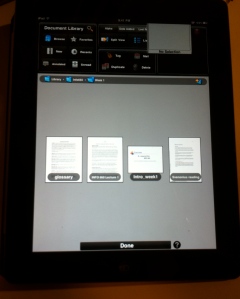I recently saw a comment that the Digital Divide is not just about hardware or physical access to the Internet. I found myself wholeheartedly agreeing with that statement. Those of us on the front line, dealing with patrons and computers in the public library see it daily. And it’s not limited to types of people we expect. Sometimes it is an older person who never had to deal with computers but who can only access the government form online now. But other times it is younger patrons, those we expect to be Digital Natives. After all, they have been using Facebook and Twitter on their mobile devices for their entire teenage years.
There are many studies and statistics about the ongoing Digital Divide. For a good factual analysis, try reading “7 Myths of the Digital Divide” by Jen Schradie (The Society Pages, April 26, 2013). But statistics can be dry and academic discussions can’t bring the story to life the way real-life examples can. So I’d like to share the stories of some of the patrons I have encountered in the last couple of months.
The man whose work history consists of being a busboy and grocery store stocker who is looking for a job with a local grocery store. He has never had to type before let alone use a word processor, something that is very common among job seekers in the library. He needs to create a resume and submit it online. These days you can’t even get a job stocking shelves in the supermarket unless you can get online. He has an email account. But doesn’t really understand saving his resume document and emailing it to himself because anything saved to the computer is going to be wiped clean as soon as he logs off.
The woman doing school work, typing documents in a word processing program who is confused by the display that shows her going on to a new page. She is afraid she has done something wrong. Again, saving her work is an issue and she ends up printing things out as she goes, even though the document isn’t finished.
The twenty-something woman looking for a job in a hotel or local retailer. She has a web address, but types it into the search box instead of into the URL space. She ends up on a third party site. When helped to get to the correct hotel website, she is completely confused when the link and information she needs is not front and center but in small print at the bottom of the page. Prospective hotel guests, the primary audience for the website, don’t need the information on “Careers.” She consistently has difficulty navigating through a website and gives up, frustrated, without completing a single application.
None of these people are stupid or lazy. They all want to work or learn and are trying their best. But they are not equipped to function effectively in an online world. And they are not alone! While the first two examples are older people who never had to deal with computers while growing up and have avoided them until forced to use them, the last woman is young. Most people would expect her to be comfortable with computers. And she is, in a basic way for entertainment purposes. But get beyond the basics and it is clear that she never received effective digital literacy training.
What’s the answer? I wish I knew. The one thing I do know is that the problem is going to get worse as more government services are only available online and employers continue to require everyone to apply online and submit digital resumes. Conventional wisdom is that everything is available online. While librarians know that is not really true, many parts of life have moved to the digital realm. The problem is that many people are being left behind.
Related articles
- Digital Novices vs Digital Natives (threeteacherstalk.wordpress.com)



Great post from the front line. You make a great point regarding young people and the ability to use computers & the internet for entertainment purposes, but don’t understand how it works. I had to explain to a PhD student considerably younger than me how to do advanced searches on google and how to remove unwanted results. That said I wonder if this divide is more of a generational gap in that in elementary and secondary schools digital literacy is part of the curriculum. It is possible that the 20 year old is sitting in a gap of sorts where digital life is part her life but she hasn’t be systematically educated in it.